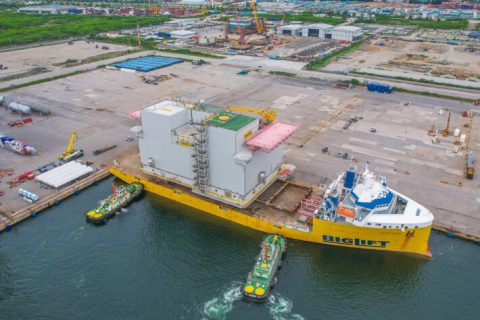
Modular construction is a growing challenge for heavy lift and project cargo
Modular construction is not only becoming prominent as of recently, but is also becoming quite a challenge for the heavy lift and project cargo industry. Modular construction is a process that involves building structures or components in factories or off-site locations, then transporting and assembling them on-site.
In its recent Monthly Maritime Consultant Outlook, it was noted that modular construction also poses opportunities for the industries responsible for transporting, installing or removing large and heavy modules, such as bridge decks, accommodation units, power plants or refineries. These modules often require special vessels equipped with cranes or derricks that can perform heavy lift operations at sea or at ports.
Increasing size
One of the challenges is the increasing size and weight of the modules, which can exceed the lifting capacity and outreach of the existing vessels and equipment. As an example, in 2023, Jumbo-SAL Alliance transported a 1,600-tonne leg encircling crane for DEME Offshore Wind Installation Vessel Sea Installer using its heavy lift vessel MV Svenja. The industry needs to invest in new technologies, equipment and skills that can enhance its capabilities, efficiency and safety to handle such mega-modules.
To remind, Scaldis was contracted to complete the installation of the crane, deploying its HLV Gulliver for the job.
Diverse and complex
Another challenge, is the increasing complexity and diversity of the modules, which can vary in shape, dimensions, materials and functions, the outlook released by MBM Consultancy reads. For example, in 2023, deugro and Roll Group delivered several oversized and out-of-gauge cargoes for TPSK project in Vietnam, including a 1,000-tonne reactor vessel.
The industry needs to adopt digital tools that can improve communication, coordination and visibility across the supply chain; use advanced lifting equipment that can adapt to different load characteristics and lifting requirements; or train its workforce to acquire new skills and competencies, the consultancy said.
Competition and regulation
A third challenge is the increasing competition and regulation in the market, which can affect the profitability and sustainability of the industry. For example, in 2023, the European Union imposed stricter emission standards for maritime transport, which increased the operational costs and environmental impact of the industry. The industry needs to embrace innovation, collaboration and sustainability to reduce its carbon footprint, increase its value proposition and differentiate itself from its competitors.
You just read one of our premium articles free of charge
Want full access? Take advantage of our exclusive offer




